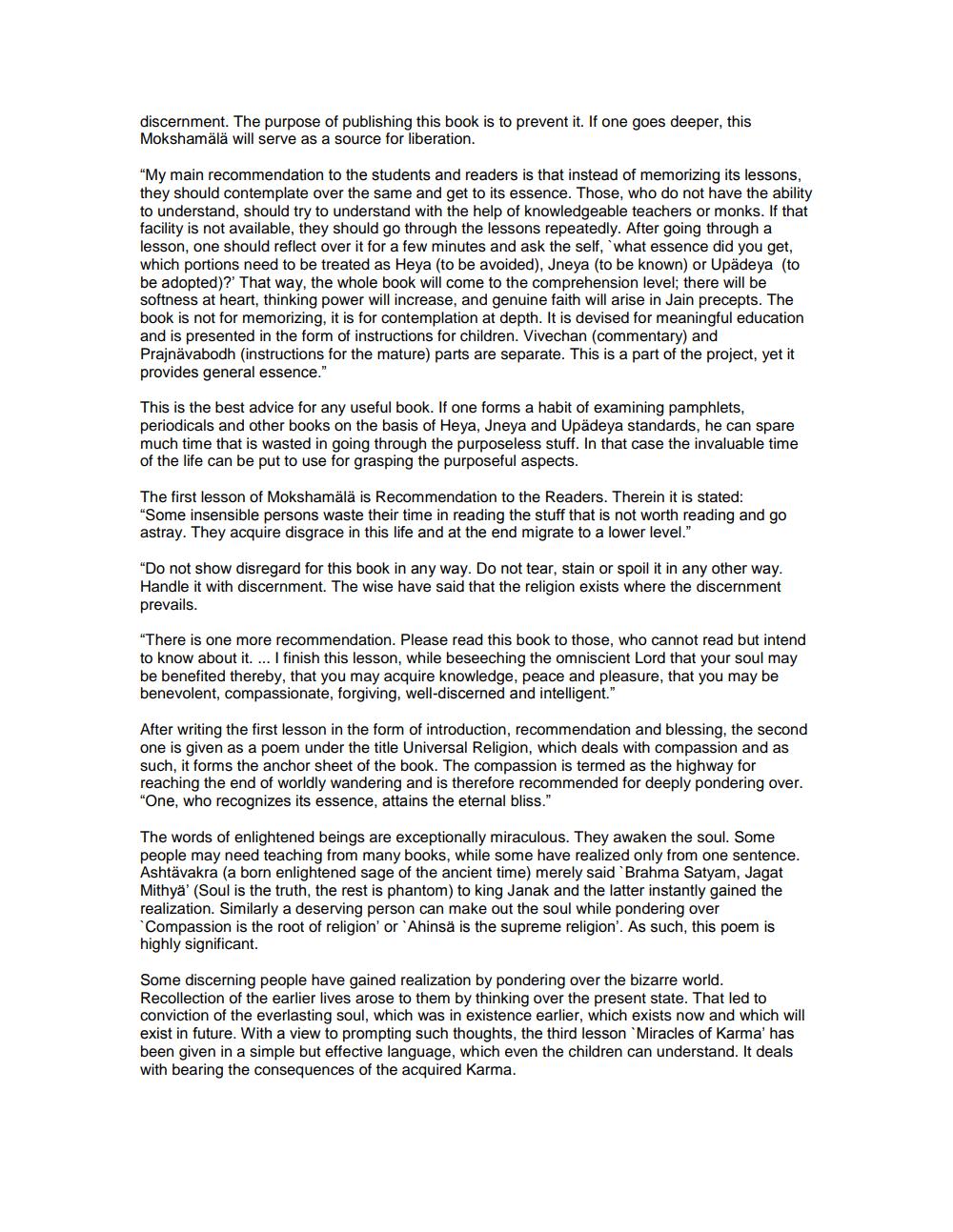________________
discernment. The purpose of publishing this book is to prevent it. If one goes deeper, this Mokshamälä will serve as a source for liberation.
"My main recommendation to the students and readers is that instead of memorizing its lessons, they should contemplate over the same and get to its essence. Those, who do not have the ability to understand, should try to understand with the help of knowledgeable teachers or monks. If that facility is not available, they should go through the lessons repeatedly. After going through a lesson, one should reflect over it for a few minutes and ask the self, what essence did you get, which portions need to be treated as Heya (to be avoided), Jneya (to be known) or Upädeya (to be adopted)?' That way, the whole book will come to the comprehension level; there will be softness at heart, thinking power will increase, and genuine faith will arise in Jain precepts. The book is not for memorizing, it is for contemplation at depth. It is devised for meaningful education and is presented in the form of instructions for children. Vivechan (commentary) and Prajnävabodh (instructions for the mature) parts are separate. This is a part of the project, yet it provides general essence."
This is the best advice for any useful book. If one forms a habit of examining pamphlets, periodicals and other books on the basis of Heya, Jneya and Upädeya standards, he can spare much time that is wasted in going through the purposeless stuff. In that case the invaluable time of the life can be put to use for grasping the purposeful aspects.
The first lesson of Mokshamälä is Recommendation to the Readers. Therein it is stated: "Some insensible persons waste their time in reading the stuff that is not worth reading and go astray. They acquire disgrace in this life and at the end migrate to a lower level."
"Do not show disregard for this book in any way. Do not tear, stain or spoil it in any other way. Handle it with discernment. The wise have said that the religion exists where the discernment prevails.
"There is one more recommendation. Please read this book to those, who cannot read but intend to know about it. ... I finish this lesson, while beseeching the omniscient Lord that your soul may be benefited thereby, that you may acquire knowledge, peace and pleasure, that you may be benevolent, compassionate, forgiving, well-discerned and intelligent."
After writing the first lesson in the form of introduction, recommendation and blessing, the second one is given as a poem under the title Universal Religion, which deals with compassion and as such, it forms the anchor sheet of the book. The compassion is termed as the highway for reaching the end of worldly wandering and is therefore recommended for deeply pondering over. "One, who recognizes its essence, attains the eternal bliss."
The words of enlightened beings are exceptionally miraculous. They awaken the soul. Some people may need teaching from many books, while some have realized only from one sentence. Ashtävakra (a born enlightened sage of the ancient time) merely said Brahma Satyam, Jagat Mithya' (Soul is the truth, the rest is phantom) to king Janak and the latter instantly gained the realization. Similarly a deserving person can make out the soul while pondering over Compassion is the root of religion' or 'Ahinsä is the supreme religion'. As such, this poem is highly significant.
Some discerning people have gained realization by pondering over the bizarre world. Recollection of the earlier lives arose to them by thinking over the present state. That led to conviction of the everlasting soul, which was in existence earlier, which exists now and which will exist in future. With a view to prompting such thoughts, the third lesson 'Miracles of Karma' has been given in a simple but effective language, which even the children can understand. It deals with bearing the consequences of the acquired Karma.




